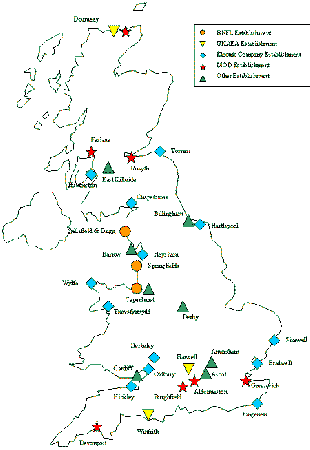UK: NUCLEAR POLLUTION - THE UNITED KINGDOM CANNOT BE TRUSTED

A Manx government spokesman was quick to rebut concerns by the Celtic League over technetium-99 discharges and general levels of pollution associated with the British nuclear facilities in the North West of England.See;
The Isle of Man government quite rightly stress that at present the levels, using presently accepted International standards, pose no threat to health. They also cited the requirements set by OSPAR which the United Kingdom government are now pledged to meet.
However, it is interesting to consider how and why the current restrictions on the United Kingdom were arrived at and also the history over the past twenty five years of technetium discharges from the UK nuclear plants.
Although the Irish and Manx government were (and still are) concerned about technetium-99 discharges from the United Kingdom (and France) the real driving force to effect International action was the Norwegian Government. One does not need to have a degree in Environment Science or be a senior figure in the IOM Government laboratory (or Radiological Protection Institute of Ireland) to work out that the alarm bells started ringing for the Norwegians when pollution levels were at a much lower level than they have ever been in the Irish sea - then or now.
When the Norwegians found technetium-99 in seaweed along Norway's west coast, and in Svalbard, in the high Arctic they started to step up the pressure on the British government. Once again one only has to consult an atlas to work out that Svalbard is much further away from the Sellafield out-fall or other polluting sites in Britain's north west than the Irish sea.
Yet the Norwegians were not complacent and because of their determination the technetium levels were cut back. Often when considering technetium discharges we consider the mid 1990s as an unprecedented high point. However (OSPAR) data to be found on this Norwegian web site shows that there have been peaks before which indicate quite clearly that the British cannot be trusted to always maintain a downward trend in discharges. (see below);
(Click on 'Releases of technetium-99 from Sellafield' - bottom page right)
Nor should it be assumed that the 'bad old days' of pollution from Britain's nuclear industry were in the distant past. To quote the from the 'Annual Report of the OSPAR Commission 2006/7':
«Contracting Parties report annually their data on liquid discharges of radioactive substances from nuclear installations (nuclear power stations, nuclear fuel reprocessing plants, nuclear fuel fabrication and enrichment plants, and research and development facilities). The reports contain data on discharges of total alpha, tritium, total beta excluding tritium, and individual radionuclides since 1990. The OSPAR report “Liquid Discharges from Nuclear Installations in 2005” shows that there is a downward trend of the total alpha activity discharged from all nuclear installations since 1990. However, while they remain within authorised limits, total alpha releases from the reprocessing plant at Sellafield (UK) peaked in 2003, and the fuel fabrication plant at Springfields (UK) was also a significant contributor in 2005.
Tritium releases from all installations increased in the period from 1996 to 2005, mainly due to the discharges from the reprocessing plant in La Hague (France). Whilst releases from Sellafield show an apparent drop during the corresponding period, these two reprocessing plants contribute in total approximately 78% (2005) of the overall discharge.
The sum of total beta activity, excluding tritium, from all nuclear installations has fallen significantly over the 15-year period 1990-2005. Total beta discharges are dominated by discharges from the nuclear fuel plant at Springfields and to a lesser extent the reprocessing plants. The total beta discharges from Sellafield were previously mainly attributable to the radionuclide Technetium-99, for which abatement technology was introduced in 2004.»
The Celtic League will not be reducing its scrutiny of Britain's nuclear industry until it can be certain that the United Kingdom government will honour its commitment to end pollution of the environment in which we live.
J B Moffatt Director of Information Celtic League
07/07/08
■